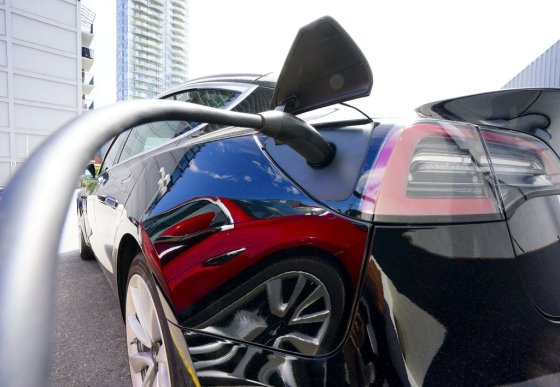|
The Canadian government is slamming the brakes on its electric vehicle mandate, at least for now.
It’s a move that couldn’t come soon enough for Canada’s automakers, distributors and dealerships.
The Justin Trudeau-era mandate would have forced the industry to sell 20 per cent of new vehicles as zero-emission next year, and it’s a number that is wildly unattainable.
Prime Minister Mark Carney announced a one-year pause on the mandate and a 60-day review of the program to make it more cost-efficient.

An electric vehicle is charged in Ottawa on Wednesday, July 13, 2022. THE CANADIAN PRESS/Sean Kilpatrick
The mandate was in trouble from the very beginning, but the cancellation of federal EV incentives earlier this year was the equivalent of taking a dumpster fire and tossing it into a tornado.
The current price gap between fossil-fuel vehicles and EVs is still too great to expect widespread consumer adoption without some federal and even provincial help.
Canada is woefully behind in what is needed in charging infrastructure to make more drivers comfortable with owning an EV.
It is absolutely true that all EV drivers now have enough infrastructure to handle 100 per cent of their daily commuting needs. Most EVs are charged at home and all exceed in range the average Canadian commuting distance.
It’s the longer trips — to the beach, to neighbouring cities, and so forth — that cause the most range anxiety.
There’s also the urban-rural split: the uptake of EVs in rural locations is minimal, where many residents daily exceed the average city commuting distances and thus are also nervous about switching to EVs.
Advertisement
 Why this ad? Why this ad?
The effects of imposing the mandate on the industry — at a time of roaring uncertainty due to U.S. tariffs — would have been disastrous.
As Brian Kingston, president of the Canadian Vehicle Manufacturers’ Association, which represents the Detroit Three carmakers (Ford, GM, Stellantis) in Canada, told me, the result may well have been a reduction in overall vehicle sales: “If you can’t increase the numerator (EV sales), you have to reduce the denominator (total sales).”
The news was met with relief in the industry. “The government has recognized that consumer adoption of electric vehicles is not where either government nor industry had anticipated it would be a few short years ago,” said David Adams, president of the Global Automakers of Canada, which represents non-North American carmakers operating in Canada.
“Our members are fully committed to the transition (to EVs) and this is the future of our sector, however that transition can only happen as quickly as consumers are willing to move.”
Both Global Automakers of Canada and the Canadian Automobile Dealers Association called on Quebec and British Columbia to follow Carney’s lead on their mandates and “avoid perpetuating internal trade barriers.”
|

